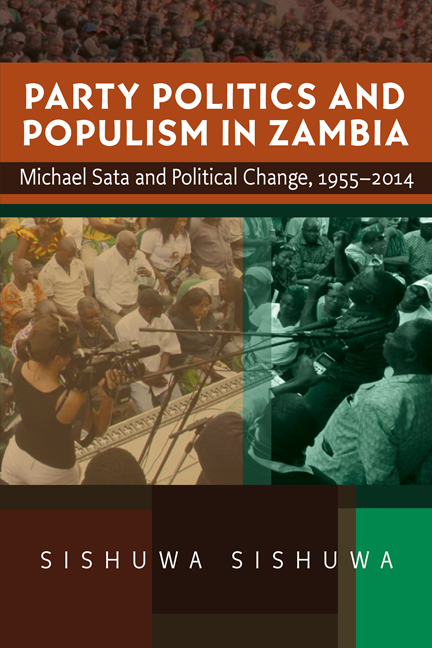Book contents
- Frontmatter
- Dedication
- Contents
- List of illustrations
- Preface
- List of abbreviations
- Map
- Introduction
- 1 Becoming Bemba and a ‘Man of Action’
- 2 Mobilising Urbanites in the One-party State
- 3 Constructing a Power Base in a Dominant Ruling Party
- 4 Building an Alternative Political Force
- 5 Winning the Prize
- Conclusion
- Bibliography
- Index
1 - Becoming Bemba and a ‘Man of Action’
Published online by Cambridge University Press: 09 May 2024
- Frontmatter
- Dedication
- Contents
- List of illustrations
- Preface
- List of abbreviations
- Map
- Introduction
- 1 Becoming Bemba and a ‘Man of Action’
- 2 Mobilising Urbanites in the One-party State
- 3 Constructing a Power Base in a Dominant Ruling Party
- 4 Building an Alternative Political Force
- 5 Winning the Prize
- Conclusion
- Bibliography
- Index
Summary
THE PERIOD between 1953 and 1964, generally described by researchers working on Zambia as the late-colonial era, was dominated by the rapid expansion of the colonial state and the push for better wages on the industrial Copperbelt. It also witnessed the intensification of the drive towards independence, led initially by the African National Congress (ANC) and later by the United National Independence Party (UNIP). This phase of Zambian history is important because it coincides with Michael Sata's migration from Northern Province to the Copperbelt, where he began work as a constable in the colonial police – a role that put him in direct conflict with African nationalists – before joining the trade union movement on the eve of independence in 1964.
In trekking to the Copperbelt, Sata followed well-trodden labour migration routes that had been established in the 1920s. By the 1950s, thousands of Africans had travelled between Northern Province and the Copperbelt and back again. Thus, at this time, Sata was one body in a great human tide. As well as being the economic powerhouse of the country, the Copperbelt also represented a training ground for political education for many Africans. A variety of prominent figures who were actively involved in the labour movement during the terminal stages of colonial rule subsequently took up leading political roles in the post-independence era. Despite the striking continuities between these eras, including the individual actors whose careers cut across these divides, few studies on Zambian history bridge the late-colonial and post-colonial periods. Most historical works take 1964 as either the end point or the start point. This may be due to researchers seeing the date of Zambia's achievement of formal independence as a historical demarcation that needs no additional justification. By drawing such a divide, however, they miss the connections in the subjects and interactions of relationships that cut across the transition, and the result is the production of a chopped-up national history that fails to capture narratives of continuity, such as how late-colonial influences manifest in the politics of the post-colonial period.
- Type
- Chapter
- Information
- Party Politics and Populism in ZambiaMichael Sata and Political Change, 1955 - 2014, pp. 33 - 66Publisher: Boydell & BrewerPrint publication year: 2024



